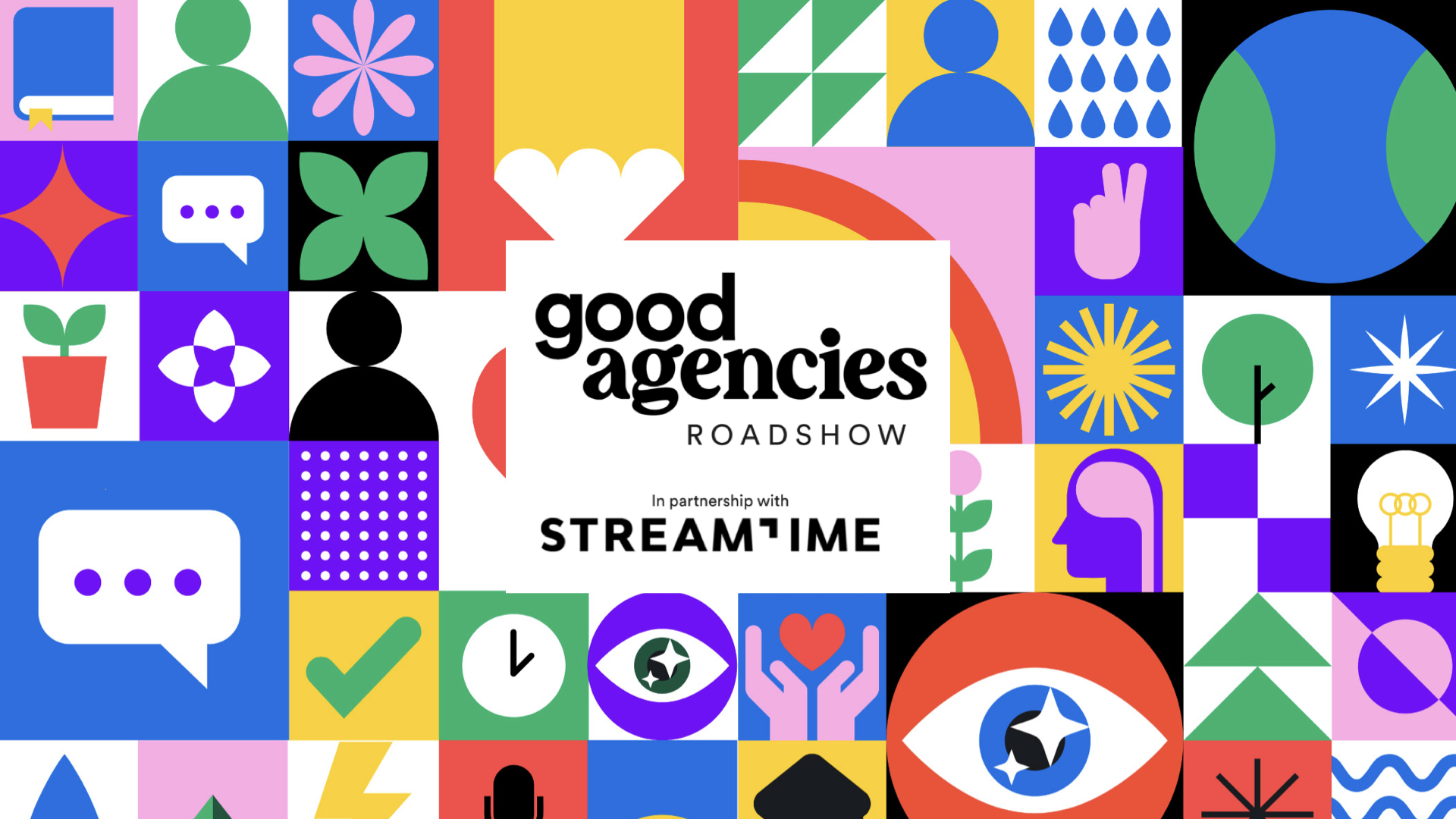Manchester Speakers
This event is taking place on Wednesday 13th September 2023, at the ABC Dome.
📢 Here are the current speakers we have for this event. We will also hear from you – the event is all about taking part.
A Year On From B Corp
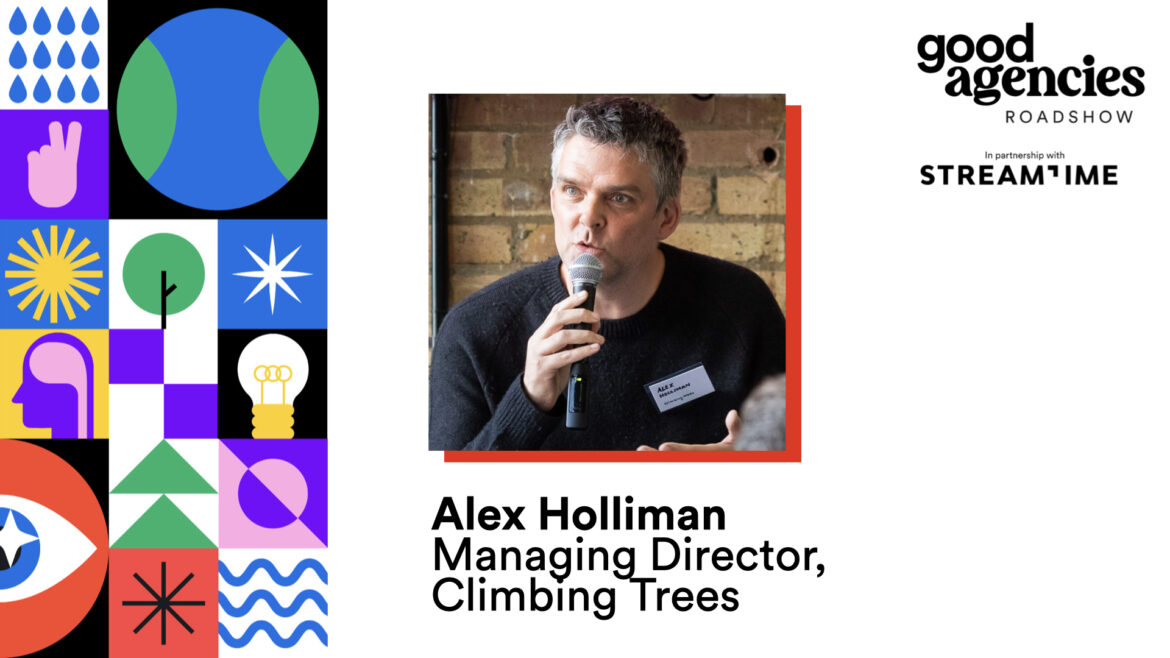
“It doesn’t count that you’ve become a B Corp – that’s actually just the starting point. It’s now about what you do when you become a B Corp,” says Alex Holliman, founder of Climbing Trees.
Becoming B Corp-certified is quickly becoming a rite of passage. Big clients won’t touch you with a barge pole unless you’ve got it – or at least an agreed-upon alternative.
Many agencies are sceptical that it means as much as people say it does.
But for Alex Holliman, it’s what you do with it that matters.
“We’ve used the certification process to build everything in the business,” he says. “We could do the bare minimum, but I’d rather do much, much better.”
Climbing Trees achieved B Corp status last year. Since then, Alex has used the framework to completely transform how the business operates, purely for the better.
A big part of this is making their purpose a collective aim of the business – not just his as founder.
“We’ve added an environmental and DEI responsibility to everyone’s job descriptions, so it’s everyone’s official responsibility. And if people see something they’re not happy with from that perspective, they can call the business out internally to challenge us to do better,” says Alex.
“In the last year, we’ve also given everyone a cost of living crisis bonus, and provided our SLT with diversity, equity and inclusion training. The full team has also gone through a six-week wellbeing and mental health course.”
And it’s not just their people. When it comes to clients and the wider community, they’re also making inroads.
“We recently went into local schools to advocate for people to join the digital industry. Beforehand, 18% of female students thought that digital was a career for them. Afterwards, that jumped to 46% – so we’re trying to double down on that.”
“We’re also doing a lot with ‘good’ clients, like Rainforest Concern. They’re an organisation that protects existing rainforests, so we’re handling their marketing for free. It’s a terrible business model, but has a much bigger impact than just planting trees.”
At the Good Agencies Roadshow, Alex will be shining a light on what B Corp status really means for his business – as well as sharing the changes he’s made to keep his people happier and make a positive impact on the planet.
How Can You Hire But Also Retain a Diverse Team?
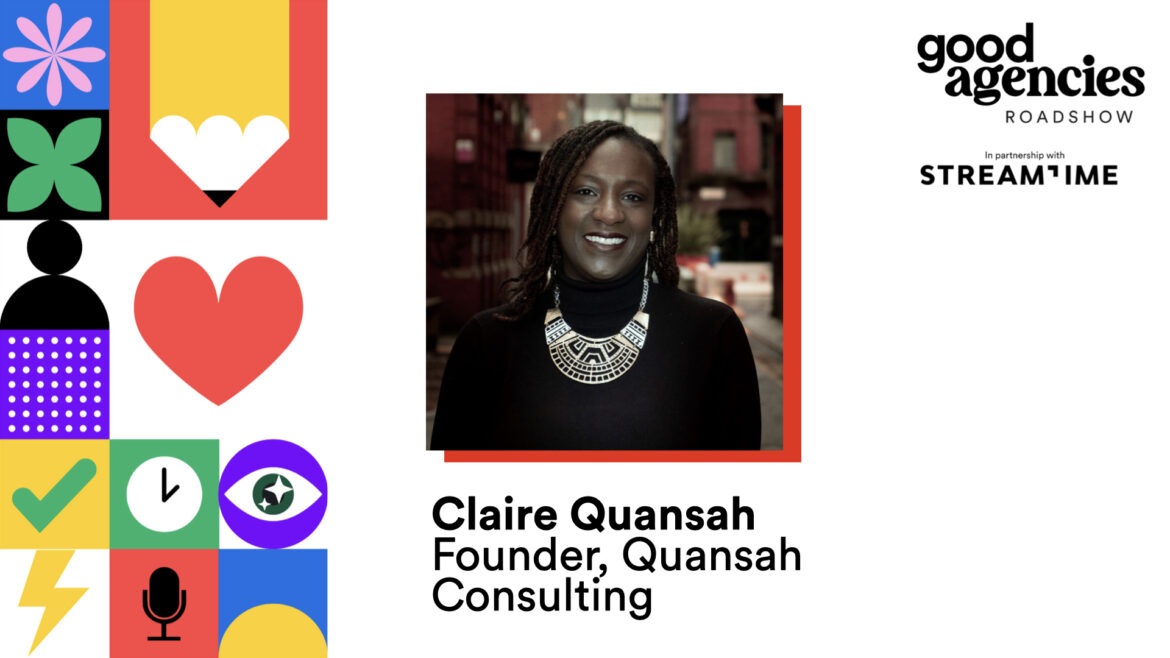
“Being a nice employer isn’t enough. It’s important for agencies to reflect on and review their practices, so they can improve the way they’re not only attracting and hiring people from diverse backgrounds, but retaining them too,” says Claire Quansah, founder of Quansah Consulting.
Claire has 20 years of agency experience including operations and biz dev, and is an advocate for diversity and inclusion in the comms space in particular. She says there is far more to be done beyond just making a few diverse hires.
“I think a lot of the time, people talk about diversity and often just focus on hiring entry-level talent, getting more graduates and college leavers into the sector, which is important – but nothing is really done structurally to then retain these people.”
To do this, Claire says it’s important to make changes within your agency to ensure that if and when you hire people from diverse backgrounds, you have the space and structure for them to really thrive.
“Using frameworks like the Blueprint Diversity Mark, it’s all about how you manage and run your business,” she explains. “Even if your workforce isn’t particularly diverse right now, if you have the right things in place, if someone were to then join your business from a diverse background, they’d probably feel more comfortable, and also confident knowing they’ve got good opportunities for progression and development.”
“To do this, especially from a structural and operational point of view, you need to have a starting point. Being able to do an audit and analysis of what your workforce looks like, how you operate right now, and therefore identifying how and where you can improve, is important.”
“It’s also about asking questions. What does your recruitment process look like? Who do you typically go to when you need a freelancer? How are you expanding your supplier network? Do you challenge your clients on these things too?”
A big part of this is starting the conversation with others on this, as well as actually doing the work, rather than just being performative.
“Don’t be afraid to ask people for help,” Claire says. “No one expects somebody to have all the answers themselves. When people know an organisation is genuinely trying to address an issue, they’re happy to have these conversations.”
“People from underrepresented backgrounds would much rather have an employer like that, than one who creates shiny logos and only posts things on social media on a particular week or month of the year.”
Claire will be joining us at the Good Agencies Roadshow in Manchester to shine a light on how to structurally support a more diverse workforce within your agency, and also why things like mentoring and training programs can be powerful tools in this space too.
“Why We’re Trying to Make Our Agency More Neuro-Inclusive”
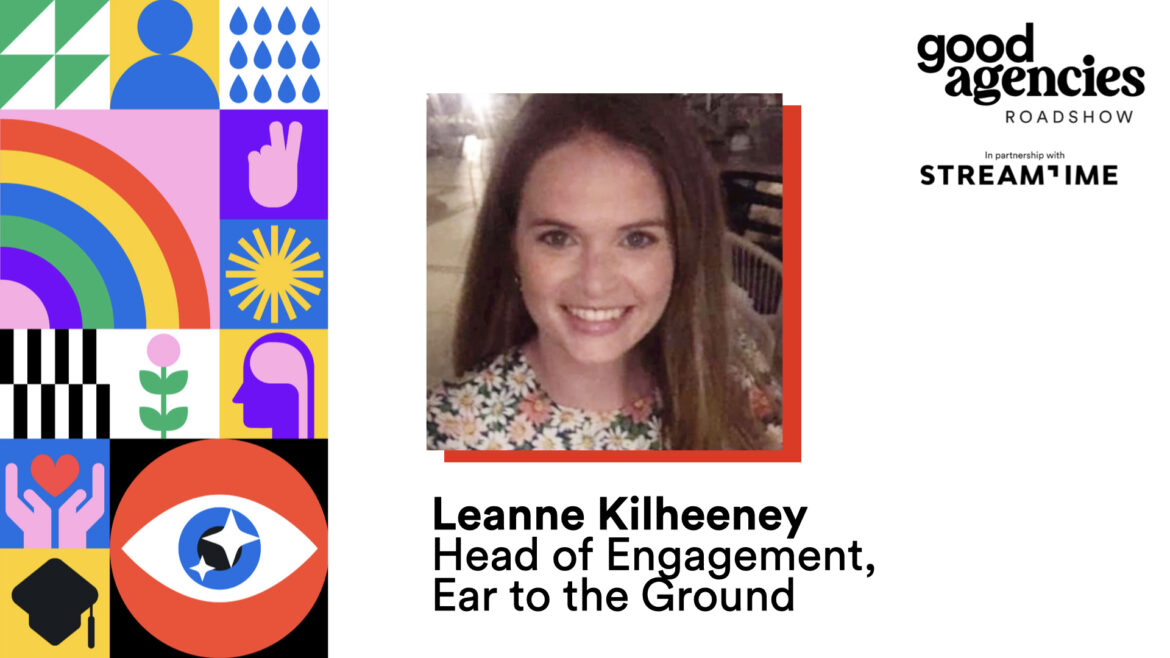
“At the beginning of this year, we set a clear EDI strategy, identifying three areas we should really focus on. One of those was Neurodiversity,” says Leanne Kilheeney, head of engagement at Ear to the Ground.
It’s thought that around 15% of the UK population is neurodiverse, but when the agency started looking into this, they realised that not a single person on their team had disclosed if they were neurodivergent.
“We were aware that with those statistics, the likelihood was a couple of people in the business probably were neurodivergent. As a business, we realised we weren’t intentionally doing enough to help these people thrive because we hadn’t invested time into removing the barriers and stigma around talking about it, and thinking about how to help before,” says Leanne.
“Now, we’re really passionate about creating an environment where people feel comfortable to speak about this, that they have a feeling of belonging at work, and that we can physically help them too by changing our environment and ways of working.”
As part of this, the EDI team in the business did a month of research, speaking to people both within the agency, the local area and in the wider agency sector. And even those initial conversations had a big difference.
“Through that research piece alone, we’ve had several people come forward and disclose diagnoses such as ADHD. That conversation wasn’t happening before, so just by showing we care and want to invest time, it’s opened that communication channel.”
Leanne and the team are still making inroads on their journey to being a more inclusive agency for neurodivergent staff, but the small changes they’ve made have already made a huge difference.
Everything from introducing fidget spinners to meeting rooms to adjustable individual lighting and a sensory area to work in, as well as creating best practice meeting guides, have all been huge hits with the entire team.
They’re even looking to change how the entire team works, to increase efficiency and concentration, by rolling out the Pomodoro method company-wide.
“Something a lot of neurodivergent people struggle with, is often they can spend either all day feeling distracted, or they can go deep into focus mode without a break,” Leanne explains.
“The Pomodoro method is just 25 minutes on, five minutes off, three times before a bigger break, and is actually something that can help everyone block time and concentrate more effectively.”
Now, the team are looking to increase the work they’re doing in this space by educating everyone across the agency, rolling out training to line managers and looking at how they manage their people.
“We have a long-term vision that will look into ensuring these habits stick. How do we make sure people are comfortable enough to come forward? How can we best support them and create that relationship?”
Leanne will be joining us at the Good Agencies Roadshow in Manchester to discuss why opening up the conversation about neurodiversity in the workplace is a huge step to being an inclusive agency, and how small changes can go a long way.
“Why Our Good Intentions with Wellbeing May Be Falling Short”
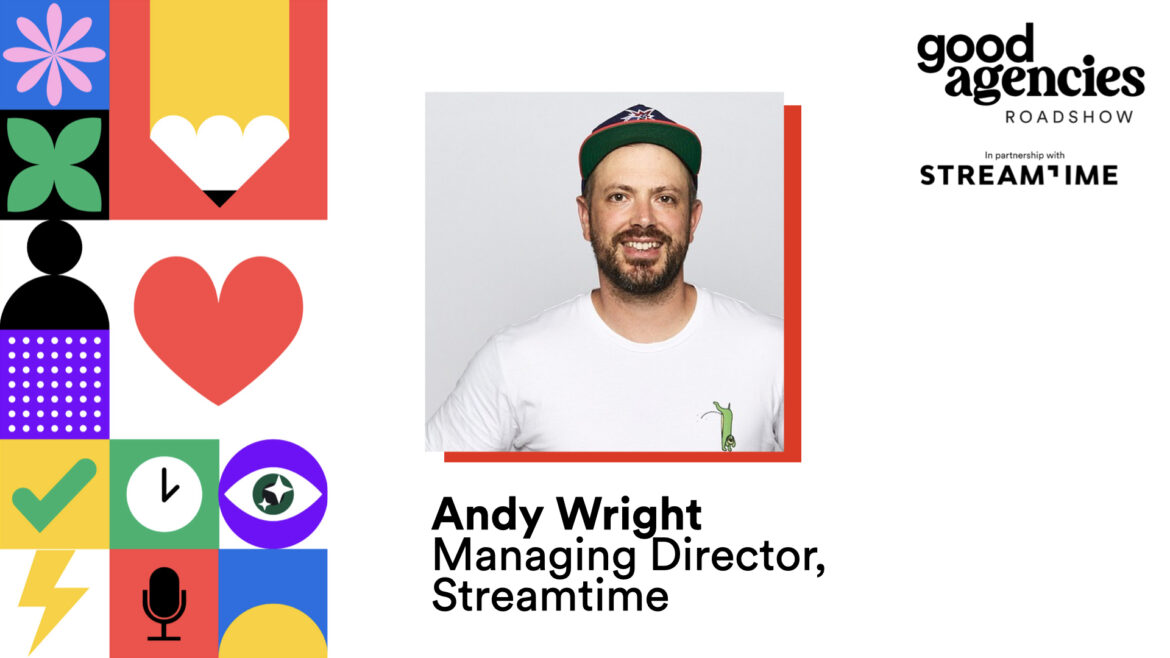
“If the most valuable assets we have are our people and their brains, why aren’t we doing more to support them and help them thrive?” asks Andy Wright, CEO of Streamtime and founder of non-profit organisation, Never Not Creative.
After a 20+ year career working in the industry, Andy now spends a lot of his time helping people and businesses to be happier and healthier, tackling some of the gaps that have been left unaddressed over the years.
Andy cautions: “When the work is elevated to the peak of importance, it can leave injustice, unfairness and illness in its wake.”
Over the last couple of years, Andy has been blurring the lines between his two roles to achieve a greater impact. Streamtime’s goal of creating happier, healthier creative businesses has certainly been influenced by the experiences that Never Not Creative has provided.
“Our Happiness Coach is a feature we’re piloting in the product. Your final To Do of the week asks you how your week was, so we can track your happiness over time. We worked very closely with Curtin University and the Future Of Work Institute to align the data we collect with their SMART work framework. Now we’re experimenting with gentle nudges on health and happiness if scores are dropping or vice versa,” says Andy.
At the Good Agencies Roadshow, Andy will share and discuss how we can create mentally healthier cultures that can help teams thrive, work excel and agencies prosper.
